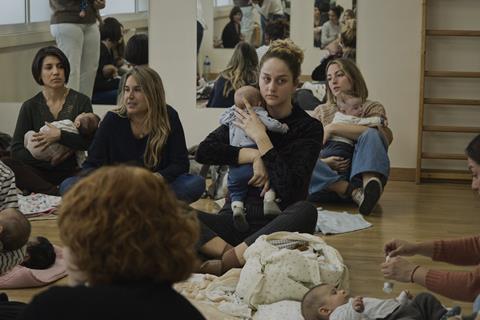A new mother’s thoughts turn murderous in Mar Coll’s gripping psychodrama

Dir: Mar Coll. Spain. 2024. 111mins
The inner turmoil of a new mother who finds she is not having the ‘right’ socially sanctioned feelings for her newborn is troublingly depicted in Mar Coll’s third feature Salve Maria. Blending psychological study with thickly laid-on horror tropes, the film is a sometimes-brilliant take on the dark area of infanficide, pitched as one woman’s quest to find out what might be behind that appalling act. Perhaps inevitably, it fails to provide many answers – but it remains a powerful and sensitive take on a tremendously difficult subject, one that is often flirted with in film but rarely addressed so directly.
A film whose concerns feel totally in tune with the times
Closely based on a novel by the Basque writer Katixa Agirre – though the film is set in Catalonia and is mostly in Catalan – Salve Maria comes to Valladolid via its premiere in Locarno with further festival screenings likely for a film whose concerns feel totally in tune with the times.
It’s clear from the outset that novelist Maria (Laura Weissmahr) is experiencing something stronger than even post-natal depression. Trapped in a small flat with baby Eric and her well-intentioned but uncomprehending boyfriend Nico (Oriol Pla), she is distant and sullen to the other mothers in her support group, edgy at home, looks absolutely washed out and is incapable of connecting with Eric. (Nico assumes that Maria’s moods are simply the result of her worry about Eric.) In one early scene, Maria is attacked by a crow that has come in through an open window like something out of The Birds – though whether the crow is real or not goes unanswered.
Eric’s constant screaming and vomiting are a frustrating reminder to Maria, a writer at the height of her creative powers, of how much of herself she’ll have to sacrifice in order to be a ‘good’ mother. Sensing that she may be coming close to the edge and seeking to understand her dangerous emotions, Maria becomes obsessed with a local woman, Alice, who is all over the news after being arrested for drowning her two small children.
Maria befriends the local perfect mother Ana (Giannina Fruttero, beautifully conveying the neurotic edge that playing such a role can bring), who has met Alice, enabling her to visit Alice’s former home and, in a chilling, potent sequence, roam its awful emptiness. On learning that a novel of hers has won an award, Maria is briefly elated, and a spring suddenly comes back into her step – which turns into an anxious run back as she realises that, in order to take the call, she has completely forgotten she literally left someone else holding the baby.
The psychological intensity of the early scenes is gripping and superbly rendered. But just when the tension should be ratching up even further, it is diluted after Maria’s pursuit of Alice leads her to abandon Nico and Eric and head for the rural village where Alice, is living whilst – somewhat implausibly – out on bail.
While Agirre’s first-person novel describes what is going on in Maria’s head in involving detail, the script isn’t always successful in finding ways to do so, depending on over-extended shots of Maria’s troubled gaze. Instead the film uses gothic horror motifs to externalise her emotions – the bird, a lonely rural graveyard and a visit by a strange nocturnal creature are just three such tropes and, after you’ve thrown in Zeltia Montes’ heavy orchestral score, things start to tip slightly too far in the direction of kitsch.
But at those points when the film is linking Maria’s sense of loss of control over her own body – when she feels that she has become nothing but a drained and bloodied provider of nourishment – then the motherhood/horror connections really strike home. And even though Maria is unable to really communicate to the viewer what’s happening inside her, Weissmahr delivers a memorably raw, bare-bones performance. She is compelling in her presentation of a woman who has crossed the line into taboo territory, and is terrified of what she might find there.
Telling epigraphs from Adrienne Rich, Sylvia Plath and others are retained from Agirre’s novel and head Salve Maria’s various chapters, grounding the film in an important cultural tradition whilst reminding us that Maria is far from being alone.
Production companies: Escandalo Films, Elastica Films
International sales: Be For Films info@beforfilms.com
Producers: Sergi Casamitjana, María Zamora
Screenplay: Mar Coll, Valentina Viso
Cinematography: Nilo Zimmermann
Production design: Laura Santos
Editing: Aina Calleja
Music: Zeltia Montes
Main cast: Laura Weissmahr, Oriol Pla, Giannina Fruttero















![[L-R]: Amanda Villavieja, Laia Casanovas, Yasmina Praderas](https://d1nslcd7m2225b.cloudfront.net/Pictures/274x183/6/4/1/1471641_pxl_20251224_103354743_618426_crop.jpg)








